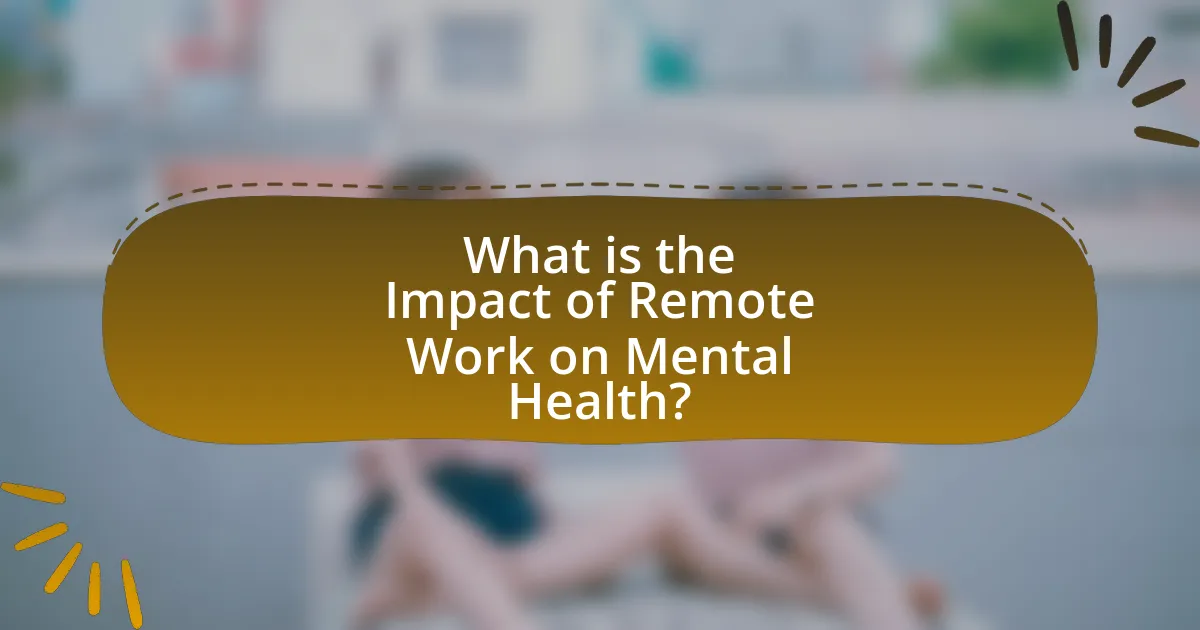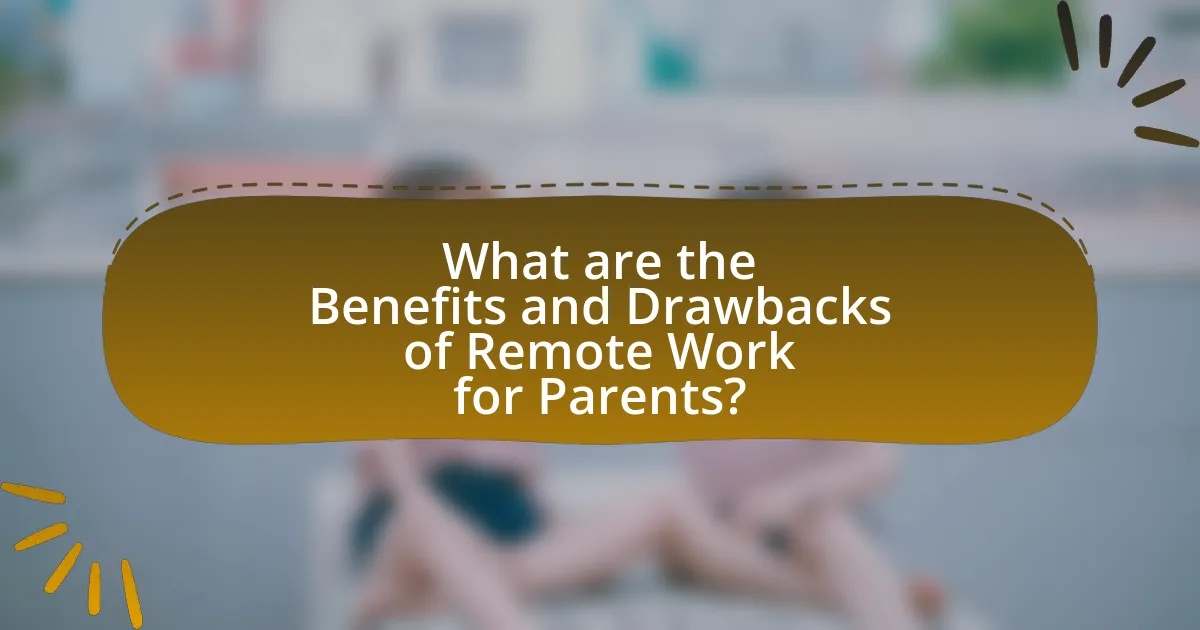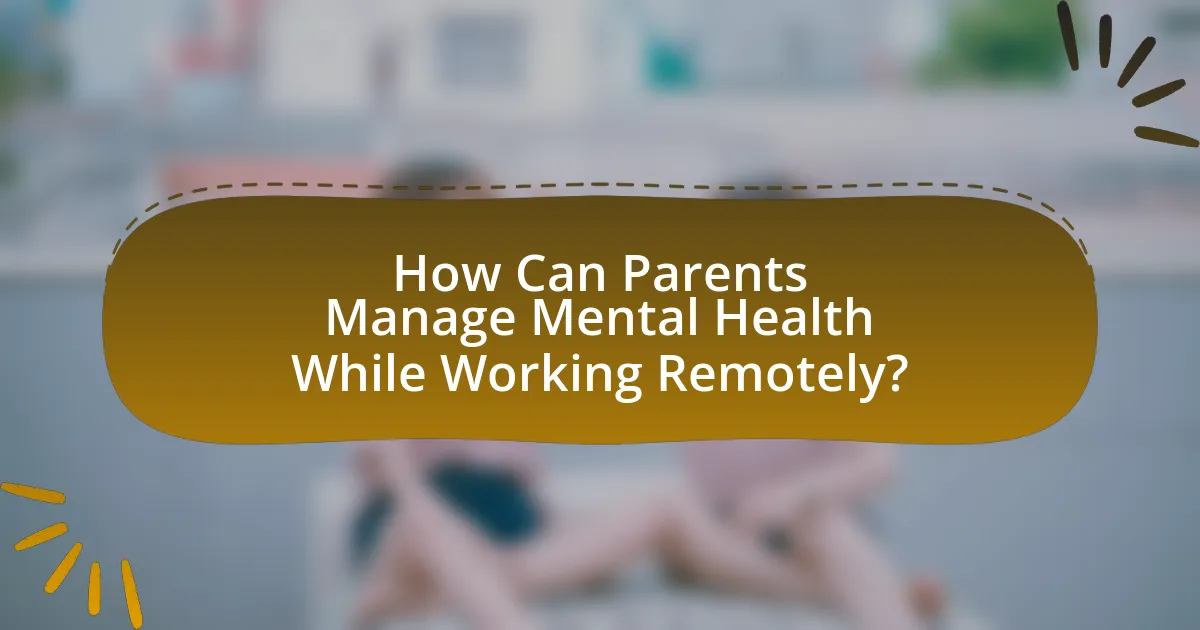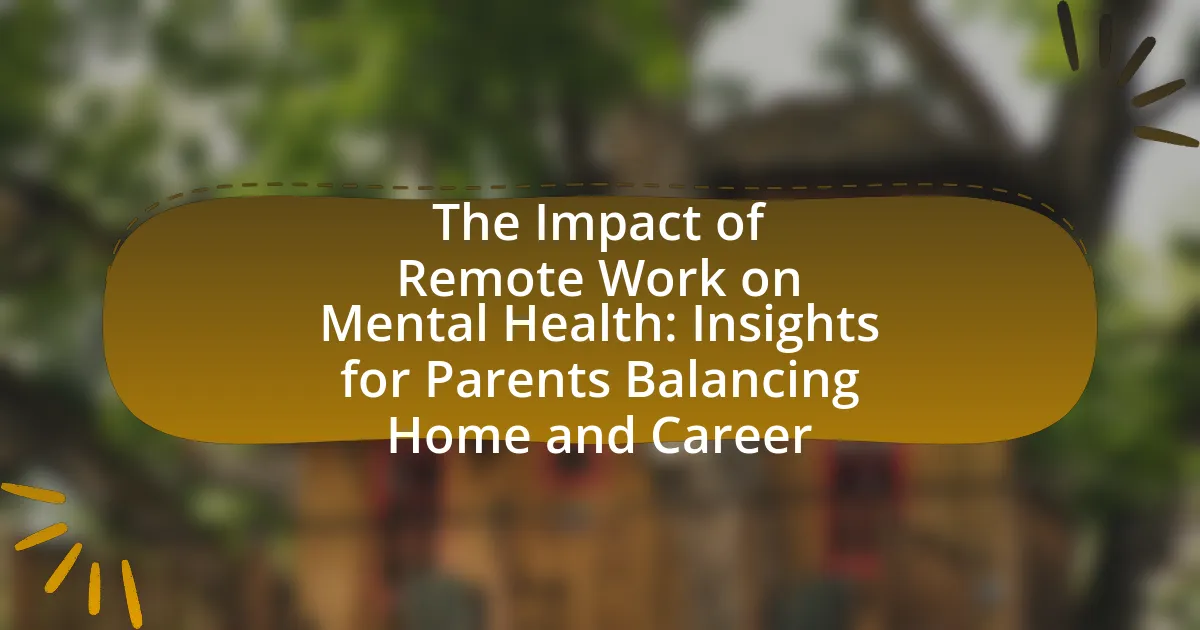The article examines the impact of remote work on mental health, particularly focusing on parents who are balancing home and career responsibilities. It highlights both the positive aspects, such as increased flexibility and reduced commuting stress, and the negative consequences, including feelings of isolation and challenges in maintaining work-life boundaries. Key findings from various studies are presented, indicating that while remote work can enhance job satisfaction and mental well-being, it also poses risks like anxiety and burnout. The article further explores strategies for parents to manage their mental health effectively while working remotely, including setting boundaries, prioritizing self-care, and utilizing available resources for support.

What is the Impact of Remote Work on Mental Health?
Remote work significantly impacts mental health, often leading to both positive and negative outcomes. On the positive side, remote work can reduce stress by eliminating commuting time and providing a more flexible work environment, which can enhance work-life balance. A study published in the Journal of Business and Psychology found that employees who work remotely report higher job satisfaction and lower levels of burnout compared to their in-office counterparts. Conversely, remote work can also lead to feelings of isolation and loneliness, as the lack of in-person interactions may diminish social support networks. Research from the American Psychological Association indicates that prolonged remote work can contribute to anxiety and depression due to these social disconnections. Thus, while remote work offers flexibility and potential stress reduction, it also poses risks to mental health that need to be managed effectively.
How does remote work influence mental well-being?
Remote work positively influences mental well-being by providing flexibility and reducing stress associated with commuting. Studies indicate that remote workers often report higher job satisfaction and lower levels of anxiety, as they can create a work environment tailored to their needs. For instance, a survey by Buffer in 2021 found that 32% of remote workers cited flexibility as the biggest benefit, contributing to improved work-life balance and overall mental health. Additionally, the absence of daily commutes can lead to more time for personal activities, further enhancing mental well-being.
What are the psychological effects of working from home?
The psychological effects of working from home include increased feelings of isolation, stress, and difficulty in separating work-life boundaries. Research indicates that remote workers often experience higher levels of anxiety and depression due to social isolation and lack of in-person interactions. A study published in the Journal of Occupational Health Psychology found that remote employees reported a 20% increase in feelings of loneliness compared to their in-office counterparts. Additionally, the blurring of boundaries between work and personal life can lead to burnout, as individuals may struggle to disconnect from work responsibilities.
How does remote work affect stress levels in parents?
Remote work generally reduces stress levels in parents by providing greater flexibility and eliminating commuting time. This flexibility allows parents to better manage their work-life balance, leading to increased job satisfaction and reduced anxiety. A study published in the Journal of Occupational Health Psychology found that remote work can lead to lower stress levels due to the ability to create a personalized work environment and the opportunity to spend more time with family.
Why is understanding this impact important for parents?
Understanding the impact of remote work on mental health is crucial for parents because it directly influences their well-being and their ability to support their children. Parents who grasp the mental health challenges associated with remote work can implement strategies to mitigate stress, improve work-life balance, and foster a healthier home environment. Research indicates that remote work can lead to increased feelings of isolation and burnout, which can adversely affect parenting quality and family dynamics. For instance, a study by the American Psychological Association found that 61% of remote workers reported higher stress levels, emphasizing the need for parents to recognize these challenges to better manage their mental health and, consequently, their children’s emotional needs.
What unique challenges do parents face while working remotely?
Parents face unique challenges while working remotely, primarily due to the dual demands of professional responsibilities and childcare. This situation often leads to difficulties in maintaining work-life boundaries, resulting in increased stress and potential burnout. Research indicates that 70% of working parents report feeling overwhelmed by the need to juggle work tasks with parenting duties, which can negatively impact their mental health. Additionally, the lack of structured environments typically found in traditional workplaces can lead to distractions, making it harder for parents to focus and be productive.
How can mental health issues affect parenting and work-life balance?
Mental health issues can significantly impair parenting and work-life balance by affecting emotional regulation, decision-making, and interpersonal relationships. Parents experiencing conditions such as anxiety or depression may struggle to provide consistent emotional support to their children, leading to increased behavioral problems in children and strained family dynamics. Additionally, mental health challenges can hinder a parent’s ability to manage work responsibilities effectively, resulting in decreased productivity and increased stress. Research indicates that parents with mental health issues are more likely to experience conflicts between work and family roles, which can exacerbate feelings of inadequacy and overwhelm. For instance, a study published in the Journal of Family Psychology found that parents with higher levels of psychological distress reported lower satisfaction in both their parenting and work roles, highlighting the interconnectedness of mental health, parenting, and work-life balance.

What are the Benefits and Drawbacks of Remote Work for Parents?
Remote work offers parents flexibility and improved work-life balance, allowing them to manage family responsibilities alongside their professional duties. This flexibility can lead to reduced stress and increased job satisfaction, as parents can create a schedule that accommodates their children’s needs. However, remote work can also lead to feelings of isolation and difficulty in separating work from home life, which may negatively impact mental health. A study by Buffer in 2021 found that 20% of remote workers reported loneliness as a significant challenge, highlighting the potential drawbacks of remote work for parents.
What advantages does remote work offer to parents?
Remote work offers parents increased flexibility, allowing them to better balance their professional responsibilities with family needs. This flexibility enables parents to create a schedule that accommodates school drop-offs, pick-ups, and other family activities, which can lead to reduced stress and improved mental health. Studies indicate that parents who work remotely report higher job satisfaction and lower levels of work-related stress, contributing to a healthier work-life balance. Additionally, remote work eliminates commuting time, providing parents with more opportunities to spend quality time with their children, further enhancing family relationships and overall well-being.
How does flexibility in work hours benefit family life?
Flexibility in work hours significantly benefits family life by allowing parents to better manage their time between professional responsibilities and family commitments. This adaptability enables parents to attend important family events, such as school functions or medical appointments, without the stress of rigid work schedules. Research from the American Psychological Association indicates that flexible work arrangements can lead to reduced stress levels and improved overall well-being, which positively impacts family dynamics. Additionally, a study published in the Journal of Family Psychology found that parents with flexible work hours reported higher satisfaction in their family relationships, demonstrating that such flexibility fosters a healthier work-life balance.
What role does reduced commuting play in mental health?
Reduced commuting significantly enhances mental health by decreasing stress and increasing time for personal activities. Research indicates that long commutes are associated with higher levels of anxiety and depression, while reduced commuting time allows individuals to engage in self-care, family interactions, and leisure activities, which are crucial for emotional well-being. A study published in the Journal of Transport Geography found that individuals who transitioned to remote work reported a 20% decrease in stress levels, highlighting the positive correlation between reduced commuting and improved mental health outcomes.
What challenges do parents encounter while working remotely?
Parents encounter several challenges while working remotely, including balancing work responsibilities with childcare and household duties. This dual responsibility often leads to increased stress and difficulty in maintaining productivity. Research indicates that 70% of parents report feeling overwhelmed by the demands of remote work and parenting simultaneously, which can negatively impact their mental health. Additionally, the lack of clear boundaries between work and home life can result in longer working hours, further exacerbating feelings of burnout.
How does isolation impact mental health for remote-working parents?
Isolation negatively impacts the mental health of remote-working parents by increasing feelings of loneliness and stress. Research indicates that social isolation can lead to higher rates of anxiety and depression, particularly among individuals who lack regular social interactions. A study published in the Journal of Occupational Health Psychology found that remote workers who reported feeling isolated experienced significant declines in their overall well-being and job satisfaction. Furthermore, the absence of in-person support systems can exacerbate the challenges of balancing work and parenting, leading to increased emotional strain and burnout.
What are the common distractions that affect productivity at home?
Common distractions that affect productivity at home include household chores, family interruptions, digital devices, and noise from the environment. Household chores can divert attention from work tasks, as individuals may feel compelled to clean or organize instead of focusing on their responsibilities. Family interruptions, particularly from children or partners, can disrupt concentration and lead to fragmented work sessions. Digital devices, such as smartphones and social media, often lead to distractions through notifications and the temptation to browse. Environmental noise, including sounds from outside or other household members, can further hinder focus and productivity. These distractions collectively contribute to decreased efficiency and increased stress for individuals working from home.

How Can Parents Manage Mental Health While Working Remotely?
Parents can manage mental health while working remotely by establishing clear boundaries between work and personal life. Setting specific work hours helps parents create a structured routine, which can reduce stress and improve focus. Research indicates that maintaining a consistent schedule can enhance mental well-being by providing predictability and stability in daily activities. Additionally, incorporating regular breaks for physical activity and mindfulness practices can further support mental health, as studies show that exercise and mindfulness reduce anxiety and improve mood. Engaging in open communication with family members about work commitments fosters a supportive environment, which is crucial for emotional well-being.
What strategies can parents implement to maintain mental well-being?
Parents can implement strategies such as establishing a structured daily routine, prioritizing self-care, and fostering open communication to maintain mental well-being. A structured routine helps create a sense of normalcy and predictability, which can reduce anxiety. Prioritizing self-care activities, such as exercise, mindfulness, and hobbies, is essential for managing stress and enhancing overall mental health. Additionally, fostering open communication within the family encourages emotional expression and support, which is vital for coping with the challenges of balancing remote work and parenting. Research indicates that structured routines and self-care practices significantly contribute to improved mental health outcomes for parents, particularly in high-stress environments.
How can setting boundaries improve work-life balance?
Setting boundaries can significantly improve work-life balance by creating clear distinctions between professional and personal time. When individuals establish specific work hours and communicate these limits to colleagues and family, they reduce the likelihood of work encroaching on personal life. Research indicates that employees who set boundaries report lower stress levels and higher job satisfaction, as they can dedicate time to family and self-care without work interruptions. A study published in the Journal of Occupational Health Psychology found that individuals who maintain work-life boundaries experience enhanced well-being and productivity, demonstrating the effectiveness of boundary-setting in achieving a healthier balance between work and personal life.
What role does self-care play in managing stress?
Self-care plays a crucial role in managing stress by promoting physical, emotional, and mental well-being. Engaging in self-care activities, such as regular exercise, adequate sleep, and mindfulness practices, has been shown to reduce cortisol levels, which are associated with stress. Research indicates that individuals who prioritize self-care report lower levels of anxiety and depression, enhancing their ability to cope with stressors, particularly in high-pressure environments like remote work. For instance, a study published in the Journal of Occupational Health Psychology found that self-care practices significantly improved resilience among remote workers, leading to better stress management outcomes.
What resources are available for parents struggling with mental health?
Parents struggling with mental health can access various resources, including therapy services, support groups, and online mental health platforms. Therapy services, such as those offered by licensed professionals, provide personalized support and coping strategies. Support groups, both in-person and virtual, allow parents to connect with others facing similar challenges, fostering a sense of community and shared experience. Online mental health platforms, like BetterHelp and Talkspace, offer convenient access to licensed therapists through messaging, video, or phone calls, making it easier for parents to seek help amidst their busy schedules. These resources are essential for addressing mental health issues and promoting well-being among parents balancing remote work and family responsibilities.
How can support groups and online communities help?
Support groups and online communities can provide emotional support and practical advice for parents navigating the challenges of remote work. These platforms facilitate connections among individuals facing similar struggles, fostering a sense of belonging and reducing feelings of isolation. Research indicates that social support can significantly improve mental health outcomes; for instance, a study published in the Journal of Health Psychology found that individuals with strong social networks reported lower levels of stress and anxiety. By sharing experiences and coping strategies, members of these groups can enhance their resilience and overall well-being while balancing home and career responsibilities.
What professional help options should parents consider?
Parents should consider several professional help options to support their mental health while balancing remote work and family responsibilities. These options include therapy or counseling services, which can provide emotional support and coping strategies; support groups that offer shared experiences and community; and family therapy to address dynamics affected by remote work. Research indicates that therapy can significantly reduce symptoms of anxiety and depression, with studies showing that cognitive-behavioral therapy is effective for many individuals facing stressors related to work-life balance. Additionally, consulting with a pediatrician or child psychologist can help parents understand and address their children’s mental health needs, which may be impacted by the parents’ stress levels.
What practical tips can parents use to balance home and career effectively?
Parents can effectively balance home and career by establishing a structured schedule that prioritizes both work responsibilities and family time. This approach allows parents to allocate specific hours for work tasks while also designating time for family activities, ensuring that neither aspect is neglected. Research indicates that maintaining a consistent routine can enhance productivity and reduce stress, which is crucial for mental well-being. Additionally, utilizing tools such as calendars and task management apps can help parents stay organized and focused, further supporting their ability to manage both domains effectively.
